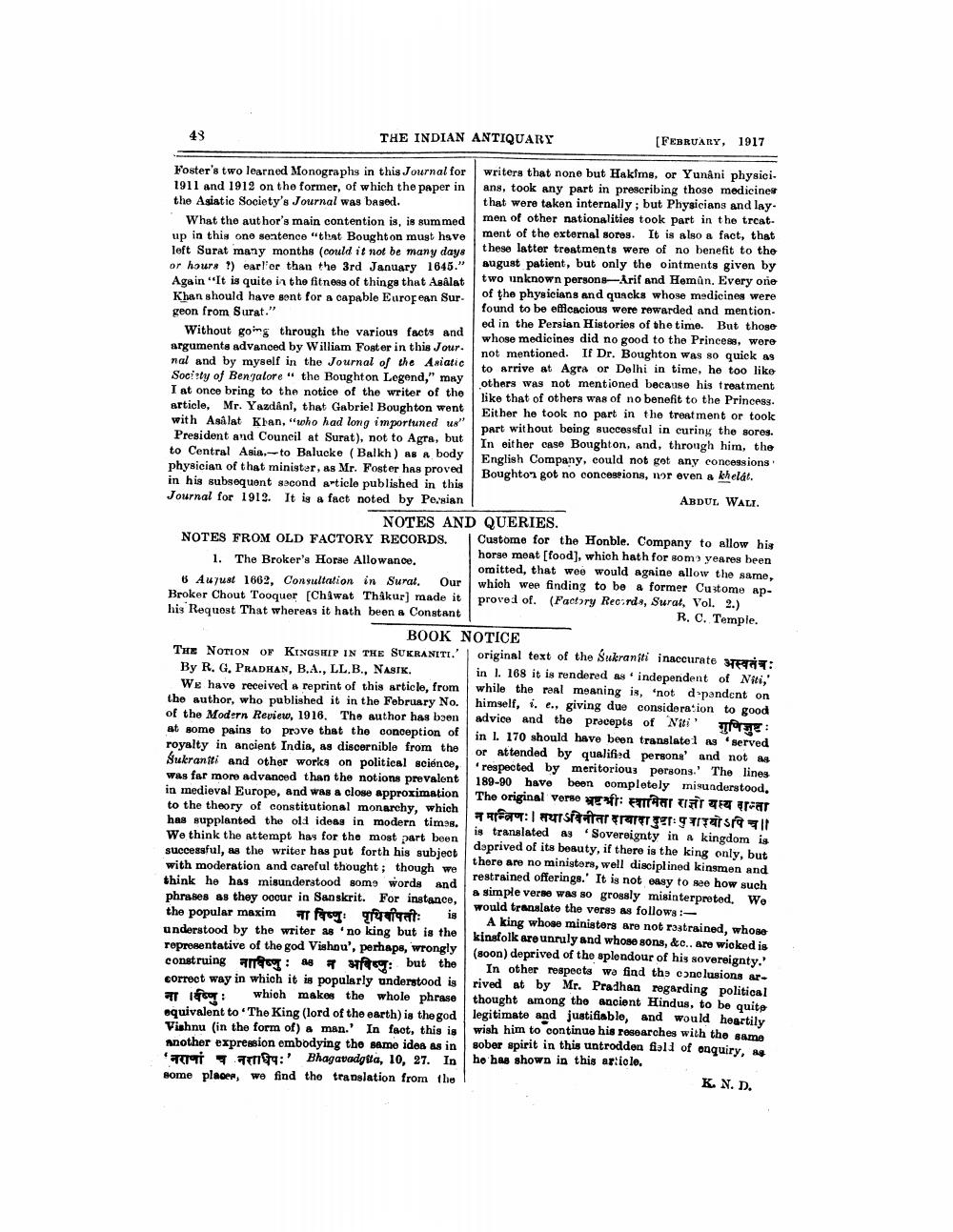________________
43
THE INDIAN ANTIQUARY
[FEBRUARY, 1917
Foster's two learned Monographs in this Journal for writers that none but Hakime, or Yunani physici. 1911 and 1912 on the former, of which the paper in ans, took any part in prescribing those medicines the Asiatic Society's Journal was based.
that were taken internally; but Physicians and lay
men of other nationalities took part in the treatWhat the author's main contention is, is summed
ment of the external sores. It is also a fact, that up in this one sentence "that Boughton must have
these latter treatments were of no benefit to the Jeft Surat many months (could it not be many days or hours ?) earlier than the 3rd January 1645."
august patient, but only the ointments given by Again "It is quite in the fitness of things that Asalat
two unknown persons-Arif and Hemûn. Every one Khan should have sent for a capable European Sur.
of the physicians and quacks whose medicines were
found to be efficacious were rewarded and mention. geon from Surat."
ed in the Persian Histories of the time. But those Without going through the various facts and
whose medicines did no good to the Princess, were arguments advanced by William Foster in this Jour.
not mentioned. If Dr. Boughton was so quick ag nal and by myself in the Journal of the Asiatic
to arrive at Agra or Delhi in time, he too like Society of Bengalore " the Boughton Legend," may
others was not mentioned because his treatment I at once bring to the notice of the writer of the
like that of others was of no benefit to the Princess. article, Mr. Yazdani, that Gabriel Boughton went
Either he took no part in the treatment or took with Asalat Khan, "who had long importuned us"
part without being successful in curing the sores. President and Council at Surat), not to Agra, but
In either case Boughton, and, through him, the to Central Asia.-- to Balucke (Balkh) as a body
English Company, could not get any concessions physician of that minister, as Mr. Foster has proved
Boughtor got no concesions, nor even a khelát. in his subsequent second article published in this Journal for 1913. It is a fact noted by Persian
ABDUL WALI. NOTES AND QUERIES. NOTES FROM OLD FACTORY RECORDS. Custome for the Honble. Company to allow his
horge meat [food), which hath for som) yeares been 1. The Broker's Horae Allowance.
omitted, that we would againe allow the same, 6 Auqust 1662, Consultation in Surat. Our which wee finding to be a former Custome apBroker Chout Tooquer (Chiwat Thakur) made it proved of. (Factory Records, Surat, Vol. 2.) his Request That whereas it hath been a Constant
R. C. Temple. BOOK NOTICE THE NOTION OF KINGSHIP IN THE SUKRANITI.' original text of the Sukraniti inaccurate : By R, G, PRADHAN, B.A., LL.B., NASIK.
in l. 168 it is rendered as independent of Niti We have received a reprint of this article, from while the real meaning is, 'not d pandent on the author, who published it in the February No. himself, i. e., giving due consideration to good of the Modern Review, 1916. The author has been advice and the pracepts of Niti' T E : at some pains to prove that the conception of in l. 170 should have been translate 1 As 'served royalty in ancient India, as discernible from the or attended by qualified persons' and not a Sukraniti and other works on political science, respected by meritorious persons.' The lines was far more advanced than the notions prevalent 189-90 have been completely misunderstood. in medieval Europe, and was a close approximation The original verse Exf Figar u ar-ar to the theory of constitutional monarchy, which
न मन्त्रिणः। सथाऽविनीता दाबादा तुष्टाः पुत्राश्योऽपि च।। has supplanted the old ideas in modern timas.
is translated as "Sovereignty in a kingdom We think the attempt hay for the most part been
is
deprived of its beauty, if there is the king only, but successful, as the writer has put forth his subject
there are no ministers, well disciplined kinsmen and with moderation and careful thought; though we
restrained offerings.' It is not easy to see how such think he has misunderstood some words and
a simple verse was so grossly misinterpreted. We phrases as they ooour in Sanskrit. For instance,
would translate the ver89 as follows: the popular maxim ना विष्णुः पृथिवीपतीः is |
A king whose ministers are not ratrained, whose understood by the writer as 'no king but is the kinsfolk are unruly and whose sons, &c. are wicked is representative of the god Vishnu', perhaps, wrongly
(soon) deprived of the splendour of his sovereignty. construing नाविष्णु : 8 न अविष्णुः but the |
In other respects we find the conclusions ar. correct way in which it is popularly understood is rived at by Mr. Pradhan regarding political A co which makes the whole phrase thought among the ancient Hindus, to be quite squivalent to The King (lord of the earth) is the god legitimate and justifiable, and would heartily Vishnu (in the form of a man.' In fact, this is wish him to continue his researches with the same Another expression embodying the same idea as in sober spirit in this untrodden field of enquiry, a 'TOTT
:' Bhagavadgtla, 10, 27. In he has shown in this ar icle. some placer, we find the translation from the
K. N. D.




